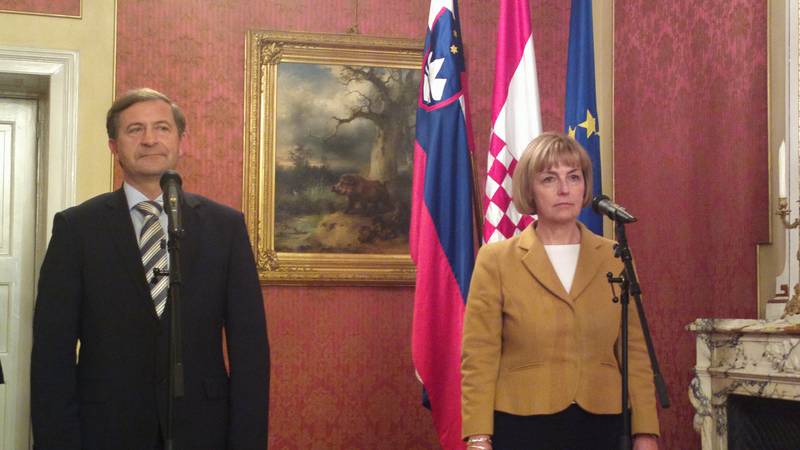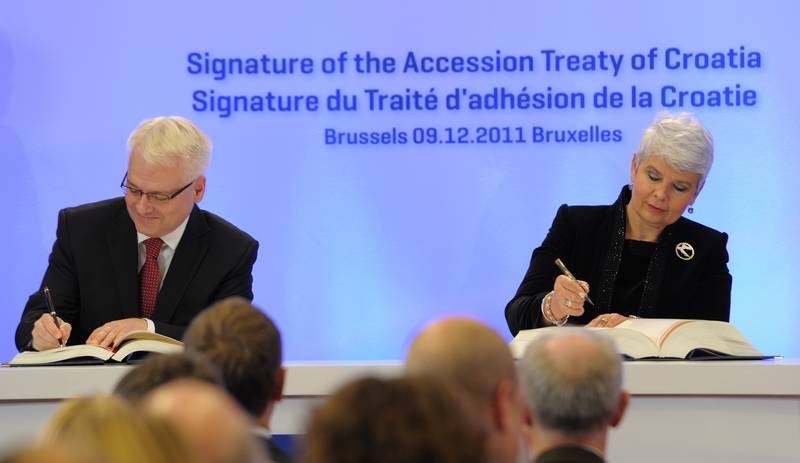The Price of European Veto or How It Failed To Settle a Dispute between Slovenia and Croatia
Adelina Marini, July 25, 2015
 In April 2009 the Stabilisation and Association Council had their fifth meeting with Croatia. Four years before its accession. Its “considerable” efforts for reforms and the progress made were commended. Negotiations had entered in their decisive phase. Little to go. Just two years later, on December 9, the Prime Minister at the time Jadranka Kosor will sign in Brussels the accession treaty. There is, of course, more work to be done like transposing EU legislation and other bits. Among the positive and encouraging sound of the conclusions after that fifth meeting of April 27, 2009 in Brussels sneaks in the reminder of the veto: “The SA Council also encouraged Croatia to enhance work on finding mutually acceptable definitive solutions to all pending bilateral issues with neighbouring countries, especially as regards border issues, and to pursue efforts aimed at reconciliation among citizens in the region.”
In April 2009 the Stabilisation and Association Council had their fifth meeting with Croatia. Four years before its accession. Its “considerable” efforts for reforms and the progress made were commended. Negotiations had entered in their decisive phase. Little to go. Just two years later, on December 9, the Prime Minister at the time Jadranka Kosor will sign in Brussels the accession treaty. There is, of course, more work to be done like transposing EU legislation and other bits. Among the positive and encouraging sound of the conclusions after that fifth meeting of April 27, 2009 in Brussels sneaks in the reminder of the veto: “The SA Council also encouraged Croatia to enhance work on finding mutually acceptable definitive solutions to all pending bilateral issues with neighbouring countries, especially as regards border issues, and to pursue efforts aimed at reconciliation among citizens in the region.”
The former roommate of Croatia in Yugoslavia, Slovenia, is never mentioned, but the Slovenian government had already vetoed Zagreb's negotiation process. No matter how far the Croatian authorities progress or what efforts they make, the door to the EU remains shut until the border dispute is solved. This reminder comes during the Czech rotating presidency of the EU. Several months later, during the Swedish presidency, on November 4, 2009 an agreement is signed by the Prime Ministers of Slovenia and Croatia. The two countries agree to settle their border dispute over the Gulf of Piran (an approximately 20 kilometre stretch of outlet to the Adriatic Sea.) by the establishment of an Arbitration Tribunal. The dispute had remained unsolved since the breakup of former Yugoslavia. The PM of Slovenia at the time, Borut Pahor (currently president of the small country), and PM Jadranka Kosor signed the Arbitration Agreement with the mediation of Swedish PM Fredrik Reinfeldt.
By signing the agreement Slovenia lifts its veto over Croatia's accession to the EU. In January of 2012 the two states establish the Arbitration Tribunal with the mediation of the European Commission. The tribunal must include one representative of each state. On the Slovenian side that is Dr Jernej Sekolec, and on the Croatian side is professor Budislav Vukas. The Tribunal is chaired by the French Judge Gilbert Guillaume. On July 10 of this year the Tribunal announced that the final ruling on the dispute over the Gulf of Piran would be read in mid-December.
A wiretap and resignations scandal
Earlier this year the Croatian public was scandalised by the statement of Slovenia's Foreign Minister Karl Erjavec, who said that, according to unofficial information, the ruling of the tribunal would be in favour of Ljubljana. What does he know, which Zagreb doesn't was the question being asked in the Croatian capital. At the beginning of May the court in The Hague voiced concerns over the possibility one of the countries got access to information that it shouldn't have, but refused to take action. Everything was peaceful and quiet until July 22 when the high-circulation newspaper Vecernji list published [in Croatian] audiotapes of wiretapped conversations between the Slovenian member of the Tribunal Dr Sekolec and Simona Drenik of the Slovenian Ministry of Foreign Affairs. It becomes clear from the recordings that there have been contacts between the two and exchange of information in violation of the agreement.
Conversations between them reveal that the decision for dividing the Gulf of Piran has already been made and Slovenia is to receive two thirds of it and Croatia - one third. Zagreb insisted the bay be split halfway. Discoveries were published for the first time in the Belgrade daily newspaper Kurir. The wiretaps created a huge diplomatic scandal between Ljubljana and Zagreb. As a result, on July 23rd Dr Sekolec resigned from the Arbitration Tribunal at The Hague. According to a press release of the Tribunal, the Slovenian government is to appoint a new member in 15 days. Croatia, however is of a different opinion. Former Prime Minister Jadranka Kosor, who signed the Arbitration agreement, posted on Twitter on Thursday, that resignations in Slovenia show, that the recordings are genuine. "The tribunal has lost credibility. The agreement is no longer valid". In a following tweet Ms Kosor wrote that the scandal throws a shadow of doubt over the independence of judiciary.
 The First Deputy Prime Minister and Minister of Foreign and European Affairs of Croatia Vesna Pusić announced on July 23 that she was sending a letter to the European Commission, as she was a mediator in the arbitration agreement. Considering the new circumstances Ms Pusić is of the opinion that an exit from the agreement should be considered. Expectations are for the government to ask for an emergency session of parliament to discuss further actions. Feelings in Slovenia are mixed. Prime Minister Miro Cerar and President Borut Pahor are of the opinion that the Tribunal should finish its job. Former president Danilo Türk, who was in office at the time the agreement was signed, also stated the scandal should not affect its validity.
The First Deputy Prime Minister and Minister of Foreign and European Affairs of Croatia Vesna Pusić announced on July 23 that she was sending a letter to the European Commission, as she was a mediator in the arbitration agreement. Considering the new circumstances Ms Pusić is of the opinion that an exit from the agreement should be considered. Expectations are for the government to ask for an emergency session of parliament to discuss further actions. Feelings in Slovenia are mixed. Prime Minister Miro Cerar and President Borut Pahor are of the opinion that the Tribunal should finish its job. Former president Danilo Türk, who was in office at the time the agreement was signed, also stated the scandal should not affect its validity.
In the midst of many reactions and analyses in media on both sides of the border you can already hear accusations of espionage. How this scandal, and respectively the border dispute, find resolution is something too early to predict, but the unsolved problem goes back to ground zero. The difference is Croatia is already a member and no veto could be levied on it to force it to accept one solution or another. This shows how tricky could the veto of a single member state towards a candidate be. Using the shadow of big European Union a single member blocks a union policy, like enlargement, more often than not for internal political aims. An end must be put to this, for in this case the interests of a single member state are projected as being interests of the entire European Union, which right now is highly compromised.
In the countries of former Yugoslavia there are dozens of unsolved border and other bilateral disputes. Some politicians state they are not going to use their veto power to put pressure on the negotiation process, but governments do change. Their views do so too.
Translated by Stanimir Stoev
 Kolinda Grabar-Kitarovic | © KGK
Kolinda Grabar-Kitarovic | © KGK Jozo Rados | © European Parliament
Jozo Rados | © European Parliament Aleksandar Vucic, Andrej Plenkovic | © Vlada RH
Aleksandar Vucic, Andrej Plenkovic | © Vlada RH